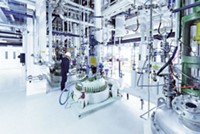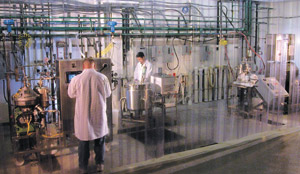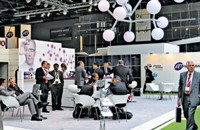Advertisement
Grab your lab coat. Let's get started
Welcome!
Welcome!
Create an account below to get 6 C&EN articles per month, receive newsletters and more - all free.
It seems this is your first time logging in online. Please enter the following information to continue.
As an ACS member you automatically get access to this site. All we need is few more details to create your reading experience.
Not you? Sign in with a different account.
Not you? Sign in with a different account.
ERROR 1
ERROR 1
ERROR 2
ERROR 2
ERROR 2
ERROR 2
ERROR 2
Password and Confirm password must match.
If you have an ACS member number, please enter it here so we can link this account to your membership. (optional)
ERROR 2
ACS values your privacy. By submitting your information, you are gaining access to C&EN and subscribing to our weekly newsletter. We use the information you provide to make your reading experience better, and we will never sell your data to third party members.
Pharmaceuticals
Changing Course
While Indian custom manufacturers push into the West, Degussa stakes out territory in Asia
by Lisa M. Jarvis
July 3, 2006
| A version of this story appeared in
Volume 84, Issue 27

As Indian companies move West in pursuit of leading positions in pharmaceutical chemical manufacturing, a number of major Western players, pressured by costs, are throwing in the towel. German chemical giant Degussa is sticking it out but recognizes that, to survive, it needs to rethink its strategy. The company is heading East, shifting portions of its manufacturing from North America and Europe to China, in a move that it believes will lower its cost base and enhance its competitiveness.
Last month, Degussa unveiled the latest steps in its effort to create what it calls a "horizontally integrated" platform for its exclusive synthesis and catalysts business. The company took a majority stake in Chinese custom manufacturer Lynchem, while at the same time agreeing to sell its Raylo Chemicals subsidiary to the U.S. drugmaker Gilead Sciences (C&EN, June 12, page 8). The moves come just a few months after Degussa signed a long-term supply agreement with the Indian custom manufacturer Hikal (C&EN, Feb. 20, page 6).
Degussa pinpointed several drivers behind the move into Asia. The advantages of a Western supplier—technology leadership, intellectual property security, and regulatory experience—are no longer enough to balance the significant cost advantages offered by Indian and Chinese firms, Alfred Oberholz, deputy chairman of Degussa's management board, told reporters at a recent briefing about the future of the exclusive synthesis business.
Prices are being squeezed as important drugs such as statins and antibacterials face generic competition. In addition, drug companies are outsourcing less manufacturing, while also introducing fewer new active pharmaceutical ingredients (APIs).
Those challenges have chipped away at the business over the past several years: Exclusive synthesis and catalyst sales were down 4% in 2004 and fell another 3% in 2005. Last October, the firm was forced to take a nearly $1 billion impairment charge on its fine chemicals activities, adding to a $500 million-plus write-down in 2003.
To counter some of the pressure on profits, Degussa has embarked on cutting costs, including the elimination of about 500 jobs in fine chemicals since early 2004. "We are in the black with the exclusive synthesis business; however, profitability is not where we'd like to have it," Oberholz said.
Meanwhile, the difficult operating environment in custom manufacturing has caused a mass exodus by Western companies that just a few years earlier had heavily invested in that industry.
Avecia kicked off the trend last fall with the sale of its pharmaceuticals unit to Indian custom manufacturer Nicholas Piramal; Rhodia was the next to go, divesting its custom synthesis business to Shasun Chemicals & Drugs, also of India; Lanxess spun off its custom manufacturing business as Saltigo; Clariant sold its pharmaceutical fine chemicals operations to the private equity firm TowerBrook Capital Partners; and, most recently, Solutia agreed to sell its pharmaceutical services business to India's Dishman Pharmaceuticals & Chemicals.
For the Western companies left standing, an Asian link is becoming critical. For example, Lonza is spending $200 million to build a pharmaceutical chemicals plant in Guangzhou, China. The site will feed intermediates to the company's U.S. and Swiss operations and also produce APIs for drugs that are nearing patent expiry.
While Lonza is going it alone, Degussa has elected to partner its way into Asia. The exclusive synthesis unit made its first move in late 2004, when Degussa opened R&D facilities in Mumbai. The next step was the nonexclusive production pact with Hikal, which enables customers to tap into Degussa's technology platform while also benefiting from Indian cost-competitiveness.
At the same time that it was partnering with Hikal, Degussa was also on the lookout for a majority stake in a manufacturing facility in Asia. The purchase of a 51% share of Lynchem was the result of a lengthy search that began with screening 20 to 30 companies in India and China. "The target from the beginning was very clear: We wanted to build a joint venture with a top player," said Patrik Wohlhauser, president of the exclusive synthesis and catalysts business.
Degussa had to weigh two critical factors in choosing between India and China: the experience of Indian companies in producing off-patent APIs against what Wohlhauser called a "quite substantial" cost differential between Indian and Chinese suppliers.
Costs won in the end. "Degussa desperately needs low-cost production now," Wohlhauser said. "We have sophisticated plants in Europe, but when it comes to standard intermediates, we are no longer competitive."
He illustrated the potential savings for both Degussa and its customers, using the example of a seven-step API synthesis. In the past, the first six steps of the synthesis would have been performed at Degussa's Seal Sands, U.K., facility, and the final step would have been done at Raylo's Edmonton, Alberta, plant.
The company now intends to do the first four steps of that synthesis in China, then finish the project in Seal Sands. Degussa says the cost savings from this arrangement could more than double the company's sales potential for the API, while still raising its profit margins.
Wohlhauser added that the sale of Raylo to Gilead is a win-win. It enables Degussa's exclusive synthesis unit to advance its Asia integration strategy, while also bringing a long-term contract to supply APIs for Gilead's HIV franchise.
Degussa will produce the Gilead APIs at its facilities in Hanau-Wolfgang and Dossenheim, Germany, and transfer production of lower valued intermediates made at those sites to Degussa Lynchem. The company will boost capacity at the German sites, as well as at Seal Sands, to accommodate these shifts in production.
Degussa's strategy isn't new, according to James Bruno, director of chemical and pharmaceutical solutions. "It may even be a little on the late side, relatively speaking," he adds, noting that a number of fine chemicals firms, particularly those serving the generics market, have assets in China.
While shifting manufacturing and basic research to a low-cost center ensures competitiveness in the near term, there could also be long-term benefits to the strategy as the pharmaceutical market develops in China. According to IMS Health, China is poised to become the sixth largest drug market within the next decade. Degussa could be positioning itself to tap into that potentially multi-billion-dollar opportunity, Bruno says.
Looking ahead, Degussa executives say they are optimistic about the prospects for the exclusive synthesis business.
Oberholz notes that Pfizer, Merck, and GlaxoSmithKline are all in the midst of closing or selling roughly 25% of their pharmaceutical chemical production capacity. "Over the next few years, we are expecting a decline in reactor volumes in Western countries that???at least we believe???will not be fully offset by growth in Asia," he says.
Oberholz is also encouraged by the breadth of the pipeline of small-molecule drugs. According to Degussa, the drug pipeline has steadily refueled since 2000, when the number of projects—from preclinical to those registered for regulatory approval—hit an all-time low of 3,840. There were 4,973 projects in the pipeline in 2005. Preclinical and Phase I compounds account for the lion's share of that growth.
Given healthier market conditions, Degussa expects the exclusive synthesis unit to grow by roughly 15% annually. Though executives are mainly focused on rolling out the new manufacturing strategy, there could still be complementary steps to come as the company tries to reach its growth target. "What we've done now need not necessarily be the last step" in the Asia integration strategy, Oberholz said.





Join the conversation
Contact the reporter
Submit a Letter to the Editor for publication
Engage with us on Twitter